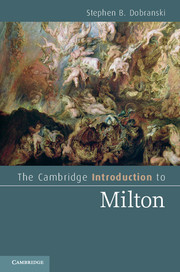Chapter 1 - Life
Published online by Cambridge University Press: 05 January 2015
Summary
We do not know what Milton and Galileo discussed when in 1638 they met outside Florence. Seventy-five and nearly blind, Galileo had been sentenced to prison five years earlier, but his punishment was commuted, and he was living under house arrest in his villa in Arcetri. As Milton would later recall in Areopagitica, “There it was that I found and visited the famous Galileo grown old, a pris[o]ner to the Inquisition, for thinking in Astronomy otherwise then the Franciscan and Dominican licencers thought” (CPW II: 538). Although Milton’s interview with the famous physicist and astronomer might surprise readers who think of Galileo as a founder of modern science and instead associate Milton with his ancient poetic forebears, the meeting of these great men hints at Milton’s social nature and, as we will see in Chapter 4, points to the inclusiveness of his epic’s subject. Certainly the conversation made an impression on the young poet: Galileo is the only contemporary whom Milton mentions by name in Paradise Lost (V.262), and his stellar, lunar, and galactic discoveries underlie the epic’s astronomy.
The two men would also prove to have much in common. Milton would begin losing his sight within the next four years, and, perhaps more important, would later discover firsthand the consequences of espousing controversial opinions. Milton lived to witness the burning of his books, both in England and on the Continent, and, after the Restoration, he went into hiding, was briefly imprisoned, and narrowly escaped worse punishment. Whereas Galileo’s published writings about the motion of the earth upset members of the Catholic Church, Milton’s radical ideas about divorce alarmed Episcopal divines, and his support of regicide threatened the foundation of English monarchy. Milton’s unfinished theological treatise – in which he argued that the Son was not eternal, insisted on the legality of polygamy, and defended the view that a person’s soul dies with the body – he would not have dared publish during the seventeenth century for fear of being put to death.
- Type
- Chapter
- Information
- The Cambridge Introduction to Milton , pp. 1 - 30Publisher: Cambridge University PressPrint publication year: 2012

